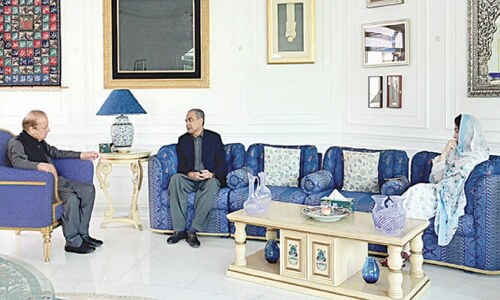
HAUNTED by artificially-capped prices and devoid of the hustle bustle of millers, traders and buyers, the grain markets of central Punjab wear a forlorn look at the height of harvest season.
Today, the Food Department is the only buyer and middlemen are waiting for the government to meet its procurement targets so that private businesses can resume their activities.
All along the M2 Motorway, vast fields of wheat seem to have turned to gold; their tops harvested and the dried golden stems still waving in the breeze, as far as the eye can see.
Sadly, many of them have been set alight. This is predominantly done by small landholders — who constitute around over 90pc of the growers — who cannot afford the costs of machinery to remove the stubble from their fields.
Hence, they resort to setting the field on fire, a phenomenon that is not only adding to the extreme heat — the temperature in parts of central Punjab was a scorching 41 degrees on Wednesday — but also polluting the environment.
Farmers and traders see shrinking crop sizes, brought on by shriveled grain, as the reason behind these trends.
“In district Sheikhupura, the yield had been averaging between 40 to 45 maunds per acre for the last several years, depending on how individual farmers handled their crop,” says Ahmed Faraz Virk, a trader and farmer from the area.
But this figure came down by 20 to 25 per cent as the early onset of summer this year caught the crop at the wrong time. As a result, crops began to ripen some two weeks early, causing a brief peak that fizzled out swiftly, leaving markets deserted.
Showing us around the deserted local market in his area, which is located in the middle of the bustling district headquarters, Muhammad Qaddaffi of Farooq Abad says: “The crop size did restrict the volume and trading time, but another factor leading to vacant markets is that each middleman was given a certain number of gunny bags and told to fill them and dispatch them to the procurement centre.”
The entire supply is now being diverted to local procurement centres, which have nearly completed their targets, as have other centres in neighbouring areas like Sheikhupura and Khanqah Dogran.
The official buying rate for wheat in Punjab is Rs2,200 per maund, but if the Food Department frees the market of its shackles, this may well shoot up by a couple of a hundred rupees. This is where the middlemen make most of their money, but this time around, the option is not available to them thus far.
An unofficial ban on inter-district wheat movement, delays in granting permission to millers to start the procurement process, and non-existent domestic buying; all of these are playing a role in making the wheat trade a very low-key affair this year.
Qaddaffi’s claim is verified by a stroll through this market, as well as others in the area.
There is hardly any activity, let alone open auctions, as is usually the case in the peak season. Compounds after compounds lie deserted in front of trading shops, where bags are traditionally stacked or mounds of open grain welcome buyers.
“Millers are not purchasing because they are still either grinding subsidised wheat (for the Ramazan package), or last year’s purchase issued at a lower price,” says Tariq Mahmood of the Sheikhupura grain market, revealing another dimension of the low trade activity in his market.
Once this official purchase stops and subsidised releases end, the wheat trade is expected to regain its natural balance. Until that time, however, which will probably come after Eid, trade and rates would stay artificially capped, he says.
The flour mills in the area, too, wear a deserted look; one hardly finds the traditional queues of trucks or tractors-trolleys unloading at their premises, or their representatives combing the local grain markets.
This is despite the millers knowing that imports this year will be a tough sell because of the Russia-Ukraine war and they will need to depend on local purchases to keep their mills running for the rest of the year.
Millers are also caught in multitude of uncertainties. They are unsure what Prime Minister Shehbaz Sharif’s rule means for them.
“His governance preferences prove that he can sell wheat lower than the purchase price,” points out Hassan Shah, who works for a flour mill in Khanqah Dogran district.
In this backdrop, should millers risk purchases? With interest rates up by 2.5pc recently, inventory-building is now an expensive proposition. Caught between their investment cost and the flour politics of PM Sharif, the millers are understandably reluctant to buy right now.
For the moment, they are content with grinding official wheat and will wait to see how the new prime minister reacts, despite the issuance by the Punjab government of permits for purchase.
The future of the crop is also concern among the middlemen and farmers alike. “With fertiliser prices multiplying at a breathtaking rate, the [middleman’s] required investment has increased by 30pcin a single season,” says Haji Ghulam Hussain from Farooq Abad.
Remember, these middlemen provide 70pc of the farmer’s credit requirement. With their financial capacity squeezed each season, the crop is bound to suffer.
Most of the dealers, traders and millers that Dawn spoke to warned that the wheat market would slowly start heating up because of a multitude of factors: limited crop sizes, increased import complications, limited national capacity to spare foreign exchange, war in the Black sea region and subsidies for expensive imports.
Farmers, who can afford to, are also holding back their commodity in hope of reaping a windfall later. If they glut the market after Eid, the price may fall in the short term. But it would certainly go up in the long term and that, in these circumstances, could mean weeks, not months.
Published in Dawn, April 29th, 2022















































